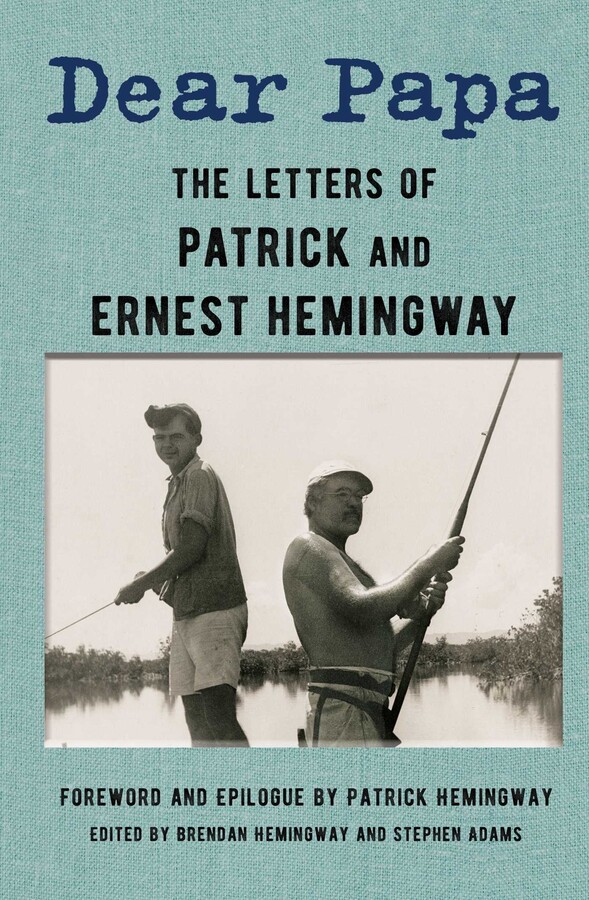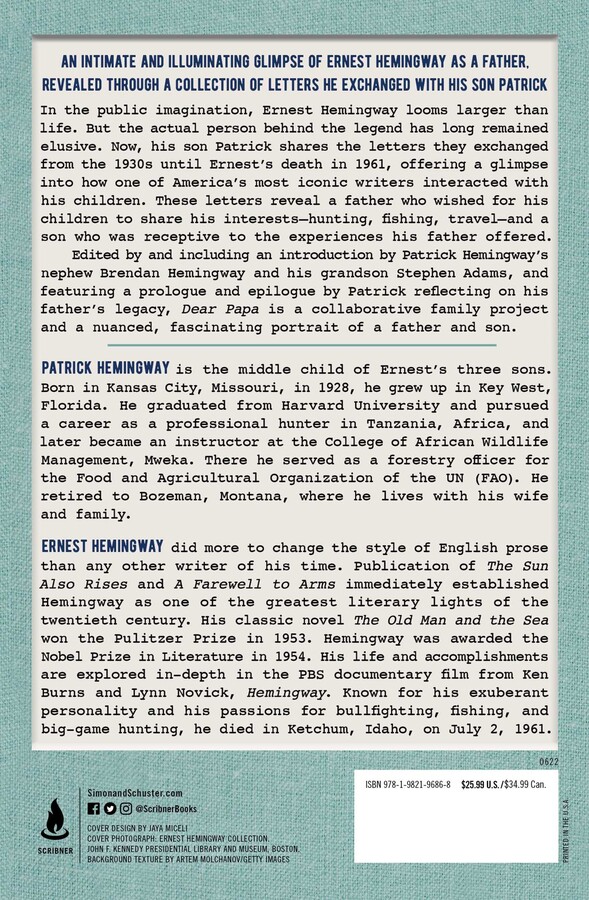Dear Papa
The Letters of Patrick and Ernest Hemingway
By Ernest Hemingway and Patrick Hemingway
Edited by Brendan Hemingway and Stephen Adams
LIST PRICE $27.00
PRICE MAY VARY BY RETAILER
Free shipping when you spend $40. Terms apply.
Buy from Other Retailers
Table of Contents
About The Book
An intimate and illuminating glimpse at Ernest Hemingway as a father, revealed through a selection of letters he and his son Patrick exchanged over the span of twenty years.
In the public imagination, Ernest Hemingway looms larger than life. But the actual person behind the legend has long remained elusive. Now, his son Patrick shares the letters they exchanged over two decades, offering a glimpse into how one of America’s most iconic writers interacted with his children. These letters reveal a father who wished for his children to share his interests—hunting, fishing, travel—and a son who was receptive to the experiences his father offered.
Edited by and including an introduction by Patrick Hemingway’s nephew Brendan Hemingway and his grandson Stephen Adams, and featuring a prologue and epilogue by Patrick reflecting on his father’s legacy, Dear Papa is a loving and collaborative family project and a nuanced, fascinating portrait of a father and son.
In the public imagination, Ernest Hemingway looms larger than life. But the actual person behind the legend has long remained elusive. Now, his son Patrick shares the letters they exchanged over two decades, offering a glimpse into how one of America’s most iconic writers interacted with his children. These letters reveal a father who wished for his children to share his interests—hunting, fishing, travel—and a son who was receptive to the experiences his father offered.
Edited by and including an introduction by Patrick Hemingway’s nephew Brendan Hemingway and his grandson Stephen Adams, and featuring a prologue and epilogue by Patrick reflecting on his father’s legacy, Dear Papa is a loving and collaborative family project and a nuanced, fascinating portrait of a father and son.
Excerpt
Prologue PROLOGUE
THIS BOOK contains selected conversations, by letter, between a father and son. It is an attempt to answer the question I have been often asked, by friends and strangers alike: “Did I know my father?”
There is a lot of hunting and fishing in these letters, but I think the significance of this correspondence is not the hunting and fishing. It’s the light it casts on our relationship, and how I grew to know my father. I grew to know him as a person, quite different than how he is often portrayed. The man I knew tried very hard to be a good family man. I think our correspondence shows he was intimately connected with his wives and his children all his life.
I would like to call up a letter by my father that he wrote to F. Scott Fitzgerald in 1925, when Papa had only one family and marriage to play with.
July 1, 1925
Burguete, Navarra
Dear Scott,
We are going in to Pamplona tomorrow. Been trout fishing here. How are you? And how is Zelda?
I am feeling better than I’ve ever felt haven’t drunk any thing but wine since I left Paris. God it has been wonderful country. But you hate country. All right omit description of country. I wonder what your idea of heaven would be. A beautiful vacuum filled with wealthy monogamists, all powerful and members of the best families all drinking themselves to death. And hell would probably be an ugly vacuum full of poor polygamists unable to obtain booze or with chronic stomach disorders that they called secret sorrows.
To me a heaven would be a big bull ring with me holding two barrera seats and a trout stream outside that no one else was allowed to fish in and two lovely houses in the town; one where I would have my wife and children and be monogamous and love them truly and well and the other where I would have my nine beautiful mistresses on 9 different floors and one house would be fitted up with special copies of the Dial printed on soft tissue and kept in the toilets on every floor and in the other house we would use the American Mercury and the New Republic. Then there would be a fine church like in Pamplona where I could go and be confessed on the way from one house to the other and I would get on my horse and ride out with my son to my bull ranch named Hacienda Hadley and toss coins to all my illegitimate children that lined the road. I would write out at the Hacienda and send my son in to lock the chastity belts onto my mistresses because someone had just galloped up with the news that a notorious monogamist named Fitzgerald had been seen riding toward the town at the head of a company of strolling drinkers.
Well anyway we’re going into town tomorrow early in the morning. Write me at the
Hotel Quintana
Pamplona
Spain
Or don’t you like to write letters. I do because it’s such a swell way to keep from working and yet feel you’ve done something.
So long and love to Zelda from us both.
Yours,
Ernest
This letter demonstrates Ernest’s complex personality and his ability to create art with his writing. As my maturity developed, I too could use my letters to create something similar to his and in certain fields, such as poetry and hunting, I could openly compete. This letter to Fitzgerald was written three years before I was born and John Hadley Nicanor Hemingway was Papa’s only son and child. My appearance on the scene, the son of Pauline Pfeiffer Hemingway, altered the complexity of the family Papa had to deal with. This complexity also affected the development of the letters between Papa and me. In the first place, there was the matter of the Catholic Church. Papa had entered into a relationship with the Catholic Church during the war that was fought in Italy, a strongly Catholic country. With his second marriage to Pauline, he would become very much under the influence of her religion, and I would be brought up as a Catholic child. This relationship in turn would be affected by Papa and Pauline’s divorce in order for him to marry Martha Gellhorn. These changes that Papa had to make in the families he felt responsible for, very much underlie the trajectory of our correspondence and the task of getting to know my father.
Patrick Hemingway
THIS BOOK contains selected conversations, by letter, between a father and son. It is an attempt to answer the question I have been often asked, by friends and strangers alike: “Did I know my father?”
There is a lot of hunting and fishing in these letters, but I think the significance of this correspondence is not the hunting and fishing. It’s the light it casts on our relationship, and how I grew to know my father. I grew to know him as a person, quite different than how he is often portrayed. The man I knew tried very hard to be a good family man. I think our correspondence shows he was intimately connected with his wives and his children all his life.
I would like to call up a letter by my father that he wrote to F. Scott Fitzgerald in 1925, when Papa had only one family and marriage to play with.
July 1, 1925
Burguete, Navarra
Dear Scott,
We are going in to Pamplona tomorrow. Been trout fishing here. How are you? And how is Zelda?
I am feeling better than I’ve ever felt haven’t drunk any thing but wine since I left Paris. God it has been wonderful country. But you hate country. All right omit description of country. I wonder what your idea of heaven would be. A beautiful vacuum filled with wealthy monogamists, all powerful and members of the best families all drinking themselves to death. And hell would probably be an ugly vacuum full of poor polygamists unable to obtain booze or with chronic stomach disorders that they called secret sorrows.
To me a heaven would be a big bull ring with me holding two barrera seats and a trout stream outside that no one else was allowed to fish in and two lovely houses in the town; one where I would have my wife and children and be monogamous and love them truly and well and the other where I would have my nine beautiful mistresses on 9 different floors and one house would be fitted up with special copies of the Dial printed on soft tissue and kept in the toilets on every floor and in the other house we would use the American Mercury and the New Republic. Then there would be a fine church like in Pamplona where I could go and be confessed on the way from one house to the other and I would get on my horse and ride out with my son to my bull ranch named Hacienda Hadley and toss coins to all my illegitimate children that lined the road. I would write out at the Hacienda and send my son in to lock the chastity belts onto my mistresses because someone had just galloped up with the news that a notorious monogamist named Fitzgerald had been seen riding toward the town at the head of a company of strolling drinkers.
Well anyway we’re going into town tomorrow early in the morning. Write me at the
Hotel Quintana
Pamplona
Spain
Or don’t you like to write letters. I do because it’s such a swell way to keep from working and yet feel you’ve done something.
So long and love to Zelda from us both.
Yours,
Ernest
This letter demonstrates Ernest’s complex personality and his ability to create art with his writing. As my maturity developed, I too could use my letters to create something similar to his and in certain fields, such as poetry and hunting, I could openly compete. This letter to Fitzgerald was written three years before I was born and John Hadley Nicanor Hemingway was Papa’s only son and child. My appearance on the scene, the son of Pauline Pfeiffer Hemingway, altered the complexity of the family Papa had to deal with. This complexity also affected the development of the letters between Papa and me. In the first place, there was the matter of the Catholic Church. Papa had entered into a relationship with the Catholic Church during the war that was fought in Italy, a strongly Catholic country. With his second marriage to Pauline, he would become very much under the influence of her religion, and I would be brought up as a Catholic child. This relationship in turn would be affected by Papa and Pauline’s divorce in order for him to marry Martha Gellhorn. These changes that Papa had to make in the families he felt responsible for, very much underlie the trajectory of our correspondence and the task of getting to know my father.
Patrick Hemingway
Product Details
- Publisher: Scribner (June 14, 2022)
- Length: 336 pages
- ISBN13: 9781982196868
Raves and Reviews
"A son’s loving memorial to his famous father. . . . Edited by Patrick’s nephew Brendan Hemingway and grandson Adams, the letters reveal shared enthusiasms for fishing, hunting, African terrain, and rigorous adventure. . . . [Dear Papa is] an intimate glimpse into Hemingway family dynamics." —Kirkus Reviews
Resources and Downloads
High Resolution Images
- Book Cover Image (jpg): Dear Papa Paper Over Board 9781982196868
- Author Photo (jpg): Ernest Hemingway Earl Theisen, 1953(0.5 MB)
Any use of an author photo must include its respective photo credit













![Farewell to Arms [Chinese] Farewell to Arms [Chinese]](https://d28hgpri8am2if.cloudfront.net/book_images/onix/cvr9781451699845/farewell-to-arms-chinese-9781451699845.jpg)
![Old Man and the Sea [Chinese] Old Man and the Sea [Chinese]](https://d28hgpri8am2if.cloudfront.net/book_images/onix/cvr9781451699821/old-man-and-the-sea-chinese-9781451699821.jpg)

